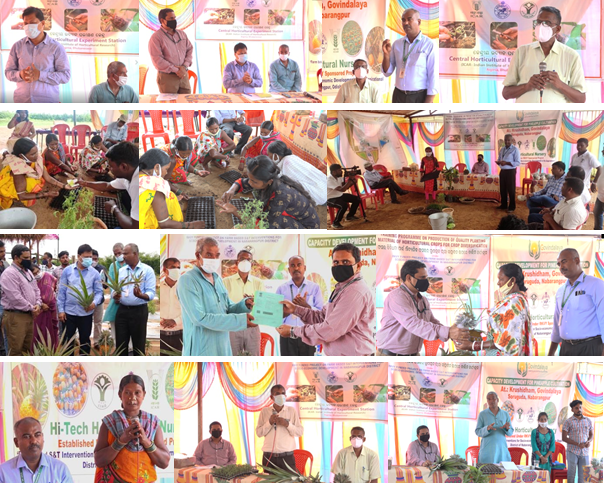
Novel horticulture based interventions are being implemented for socio-economic development of tribal-dominated Nabarangpur district of Odisha under the RKVY(S&T) initiative for ‘Farm based S&T Interventions for Socio-economic Development in the Aspirational District of Nabarangpur, Odisha’. Development of commercial nurseries of various capacities in SHG mode is one of the most sustainable interventions of CHES (ICAR-IIHR), Bhubaneswar in the district. Regular capacity building programmes are organized in the district for skill development of the stakeholders. Under this intervention a training programme was organized in the site of Hi-Tech Nursery located in the Govindalaya campus in Soruguda village of Nandahandi block of Nabarangpur district on 20th July 2021, to impart basic skills of nursery management to the SHG members and educate them about the economic feasibility of the intervention. The high tech nursery developed by Central horticultural Experiment Station (ICAR-IIHR), Bhubaneswar, at Govindalaya's Centre of Empowerment, Soruguda village of Dangarbheja Panchayat in Nandahandi Block also has mother blocks for fruit crops.
Inaugurating the programme the DM & Collector of the district Sri Ajit Kumar Mishra, expressed satisfaction on the achievements of the horticultural interventions in the districts and particularly appreciated the nursery intervention which will lead to self-sufficiency for planting material in the district and nearby areas. He showed keen interest in the propagation of pineapple which came to fruiting during June-July in the Queen variety pineapple mother block.
Deputy Director Horticulture for Nabarangpur district Dr. Pradosh Kumar Panda addressed the trainees and called upon for proper licensing and accreditation of the nurseries for proper commercial utilization of the facilities created by CHES (ICAR-IIHR), Bhubaneswar. He also enlisted various horticultural schemes available for the farming community of the district. Speaking on the occasion Sri Satya Prakash Samantray, CDAO, Nabarangpur, stressed upon the organic ways of cultivation to minimize the adverse effect of agro-chemicals on soil, animals and human beings. Eminent journalist Sri Laxminarayana Boxi put forth the need for wide spread reach of the latest knowledge of horticultural technologies in the district for uplifting the socio-economic conditions of the tribal farmers. During his discourse, Dr. G. C. Acharya, Head, CHES (ICAR-IIHR) and Co-PI of the project informed the trainees on the successful adoption of ICAR-IIHR fruit and vegetable varieties. He assured full technological support of ICAR-IIHR to the stakeholders involved in horticulture. Dr. P. Srinivas, Principal Scientist and Principal Investigator of project, informed the participants about the development commercial nurseries of various capacities in SHG mode in different parts of Nabarangpur, popularization of ICAR-IIHR varieties through backyard kitchen gardening through Arka kitchen garden kits and Arka urban garden kits, enhancing economic status of the rural and tribal farmers through introduction of high yielding ICAR-IIHR vegetable varieties and improved agro-technologies and improving horticulture activity based skills of the stakeholders through various training and awareness programmes, under the RKVY S&T project. Sri Sanmuga Patro proposed vote of thanks on the behalf of the Ma Mahima SHG and Govindalaya, while seeking continued support of the state government and CHES (ICAR-IIHR), Bhubaneswar. Selected tribal beneficiaries narrated their success stories with ICAR-IIHR technologies in presence of the guests and dignitaries. Symbolic handing over of the MoU for licensing of Arka Bangara 2 variety of marigold by Govindalaya was also done during the programme.
During the post lunch session, basic training on seedling raising using soilless media in potrays, grafting and air-layering for fruit crop propagation, and on Nursery management, was imparted to the participants. The SHG beneficiaries were provided with basic inputs, tools and training for operating nursery activities. The participants were given hands-on training and demonstrations on techniques like soil media preparation, filling of poly bags and potrays, root and stem cuttings of cucurbitaceous crops, grafting for fruit crops, etc. During the training necessary skills for propagation of planting material of Mango, guava, pine apple, jackfruit, ivy gourd, teasel gourd, marigold, tuberose, etc. were demonstrated.
The programme was coordinated and organized by a team led by Dr. P. Srinivas, Principal Scientist and Principal Investigator and Dr. G. C. Acharya, Principal Scientist and Co-Principal Investigator of Horticulture component of RKVY (S&T) project.
